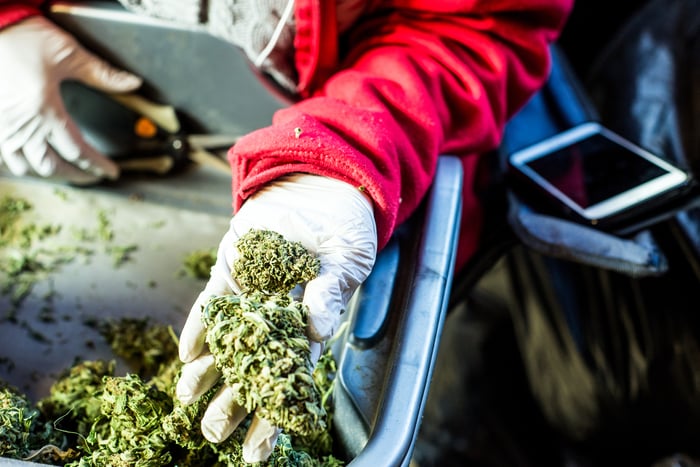In case you've been living under a rock for the past couple of years, the marijuana industry is all the buzz on Wall Street. In roughly 2 1/2 months, Canada is set to become the first industrialized nation in the world to sell adult-use cannabis. This is made possible by Parliament's passing of the Cannabis Act in June.
When recreational marijuana becomes legal, the expectation is that it'll usher in huge demand, and therefore a lot of money for the industry. Initial figures suggest that revenue could total $5 billion annually, on top of what the industry is already generating from medical pot and exports, once the industry is at full capacity. These lofty sales projections are a big reason why pot-stock valuations were pushed into the stratosphere earlier this year.

Image source: Getty Images.
Supply-and-demand uncertainties proliferate with legalization looming
But there are also key uncertainties associated with legalizing adult-use weed in a market as large as Canada. Namely, the supply-and-demand outlook is highly uncertain. Though demand should be strong, no one is exactly sure how much cannabis will be purchased each year.
Conversely, supply expectations have been incredibly fluid. With growers expanding as quickly as their balance sheets would allow in the first half of the year, it's not out of the question that oversupply will wreak havoc on the industry by as early as 2020.
However, marijuana oversupply doesn't have to be a margin death knell to pot stocks. While what few examples we have -- Colorado, Washington, and Oregon -- demonstrate that per-gram dried flower prices tend to be commoditized and fall precipitously not too long after the substance becomes legal, marijuana stocks that focus on alternative cannabis products can still thrive.
An "alternative cannabis product" includes oils, concentrates, vaporized cartridges, infused creams or lotions, infused beverages, and edibles. These alternatives pot products tend to have higher price points than traditional dried flower, and most importantly are commoditization-resistant. That should result in far less pricing pressure and beefier margins for growers that choose to focus on these products in addition to dried cannabis production.
It's these alternative products that have the full attention of the alcohol industry.

Image source: Getty Images.
Constellation Brands chases growth
Interestingly enough, one of the casualties of legalizing cannabis could be the alcohol industry. While nothing is written in stone, Wall Street analysts and certain surveys have suggested that consumers could make a conscious choice to drink less alcohol in favor of using marijuana. This concern is probably what drove Corona beer owner Constellation Brands (STZ -0.94%) to make an equity investment in the largest publicly traded pot stock in the world, Canopy Growth Corp. (CGC -2.01%), in late October.
Constellation acquired a 9.9% equity stake in Canopy Growth for about $190 million and has subsequently also gobbled up more than $150 million worth of convertible debt sold by Canopy Growth. Aside from the fact that Constellation has netted a solid return on its investment (thus far, a triple-digit percentage gain), the duo is aiming to collaborate on a number of new products. Canopy's leading brands and cannabis knowledge, when combined with Constellation's distribution network and alcohol knowledge, could allow for a number of innovative new products.
It's worth noting here that while infused beverages would be the primary target of any alcohol-cannabis partnership, they (and edibles) aren't currently legal -- nor will they be when the proverbial green flag waves on October 17. The Cannabis Act contains amendments allowing Parliament to discuss legalizing edibles and infused beverages in the future, which most industry experts believe will happen sometime next year.

Image source: Getty Images.
Molson Coors snags a cannabis partner
Of course, Constellation Brands hasn't been the only alcohol giant looking for a cannabis partner. Molson Coors Brewing (TAP -1.81%), according to a BNN Bloomberg report, made it abundantly clear in June that it was looking to tap into the high-growth legal pot industry in Canada.
In May, Molson Coors' first-quarter operating results showed that sales declined 2.5% in Canada, 5.8% in the U.S., and the company's operating profit fell 40% shy of Wall Street's expectations. In other words, the company is already feeling a growth pinch and its earnings miss led to the biggest one-day decline in its share price in 13 years. This makes partnering with a fast-growing marijuana company more of a necessity for Molson Coors than an option.
This past week, we learned that Molson Coors has settled on Quebec-based Hydropothecary Corporation (HEXO) as that partner. According to the joint press release (pun fully intended), the two companies will form a joint venture. Molson Coors will control 57.5%, and Hydropothecary the remaining 42.5%. And as you might imagine, the duo will primarily focus on non-alcoholic, cannabis-infused beverages, which are expected to become legal in 2019. Said Molson Coors Canada CEO Frederic Landtmeters, "While we remain a beer business at our core, we are excited to create a separate new venture with a trusted partner that will be a market leader in offering Canadian consumers new experiences with quality, reliable and consistent non-alcoholic, cannabis-infused beverages."
Admittedly, Hydropothecary is a surprising choice, given that it may not even crack the top 10 in terms of cannabis production by the time all growers are up to full capacity. It's currently aiming for about 1.3 million square feet of capacity, which management expects will yield 108,000 kilograms per year.
But what may have swayed Molson Coors' to partner with Hydropothecary is its existing focus on cannabis alternatives, as well as its massive five-year supply agreement with Quebec, totaling 200,000 cumulative kilograms. If Hydropothecary can land supply deals as large as this, Molson Coors' management team might be of the opinion that management has its act together.

Image source: Getty Images.
The big concern for each company
Now, before you break out the champagne, understand that there's a clear concern here for both parties involved in this joint venture.
With regard to Molson Coors, there's no guarantee that infused beverages turns into an instant winner or needle mover for the company. Though demand for anything cannabis has been pretty strong, Molson Coors is a company with an expected $11 billion in revenue this year. Just how much of a boost is Molson Coors going to receive from infused-beverage sales? My suspicion is it may not be enough to make a noticeable difference for at least a few years.
As for Hydropothecary, the biggest concern remains share-based dilution. Though this joint venture clearly puts it on the map (in case it wasn't there already in the minds of pot-stock investors), the joint press release also notes that warrants will be issued to Molson Coors to purchase shares of Hydropothecary. Issuing stock, convertible debentures, stock options, and warrants has been common for Canadian marijuana stocks. Unfortunately, it can negatively weigh on earnings per share and existing shareholders.
Though worries persist, this is unlikely to be the last we hear of the alcohol industry partnering with pot companies.





